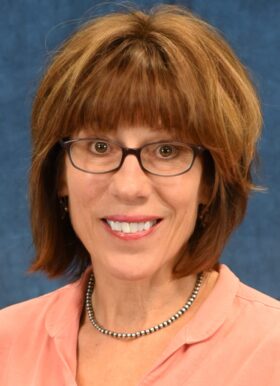
Jill B. Firszt, PhD
Professor
Otolaryngology—Head and Neck Surgery
Director, Cochlear Implant Program
Mailing address
Washington University School of Medicine
Department of Otolaryngology-Head and Neck Surgery
660 S. Euclid Ave.-Campus Box 8115
St. Louis, MO 63110
Clinical and research interests
Dr. Firszt’s clinical and research interests include bilateral and unilateral cochlear implants in adults and children, asymmetric hearing and unilateral haring loss, speech recognition, behavioral and electrophysiologic measures with electrical stimulation and optimization of speech processor mapping.
St. Louis Children’s Hospital Cochlear Implant Program
Education
- BS Speech and Hearing Science, University of Illinois, Champaign, IL (1978)
- MA Educational Audiology, University of Illinois, Champaign, IL (1982)
- PhD Speech and Hearing Science, University of Illinois, Champaign, IL (1998)
- Fellowship in Audiology, Carle Clinic Association, Urbana, IL (1982-1983)
Selected publications
- Firszt JB, Chambers RD, Kraus N, Reeder RM. Neurophysiology of cochlear implant users I: Effects of stimulus current level and electrode site on the ABR, MLR and N1-P2 response. Ear Hear 2002; 23, 6: 502-515.
- Firszt JB, Reeder RM, Holden TA, Burton H, Chole RA. Changes in auditory perceptions and cortex resulting from hearing recovery after extended congenital unilateral hearing loss. Frontiers in Systems Neuroscience, 2013, 7, 108. PMCID: PMC 3985019
- Firszt JB, Chambers RD, Kraus N. Neurophysiology of cochlear implant users II: Comparison among speech perception, dynamic range, and physiologic measures. Ear Hear 2002; 23(6): 516-531.
- Firszt JB, Holden LK, Skinner MW, Tobey EA, Peterson A, Gaggl W, Runge-Samuelson CL, Wackym PA. Recognition of speech presented at soft to loud levels by adult cochlear implant recipients of three cochlear implant systems. Ear Hear 2004; 25(4): 375-387.
- Firszt JB, Koch DB, Downing M, Litvak L. Current steering creates additional pitch percepts in adult cochlear implant recipients. Otol Neurotol 2007;28(5):629-636.
- JB, Reeder RM, Skinner MW. Restoring hearing symmetry with two cochlear implants or a cochlear implant and contralateral hearing aid. J Rehab Res Develop 2008;45(5):749-768. PMID: 18816424
- Firszt JB, Holden LK, Reeder RM, Skinner MW. Speech recognition in cochlear implant recipients: Comparison of standard HiRes and HiRes 120 sound processing. Otol Neurotol 2009;30(2):146-52. PMCID: PMC3603702
- Firszt JB, Holden LK, Reeder RM, Cowdrey L. Effects of asymmetric hearing loss in cochlear implant recipients. Audiol Neuro-Otol 2011;16(S1), 15-17. PMID 21527825
- JB, Holden LK, Reeder RM, Cowdrey L, King S. Cochlear implantation in adults with asymmetric hearing loss. Ear Hear 2012, 33:521-533. PMCID: PMC3383437
- Burton H, Firszt JB, Holden TA, Agato A, Uchanski RM. Activation lateralization in human core, belt, and parabelt auditory fields with unilateral deafness compared to normal hearing. Brain Research, 2012;1454:33-47. PMCID: PMC3403813
- JB, Holden LK, Reeder RM, Waltzman SB, Arndt S. Auditory abilities after cochlear implantation in adults with unilateral deafness: A pilot study. Otol Neurotol, 2012, 33:1339-1346. PMCID: PMC3603694
- Holden LK, Finley CC, Firszt JB, Holden TA, Brenner C, Potts LG, Gotter BD, Vanderhoof SS, Mispagel M, Heydebrand G. Factors affecting open-set word recognition in adults with cochlear implants. Ear Hear, 2013, 34:342-360. PMCID: PMC3636188
- Dwyer N, Firszt JB, Reeder RM. Effects of unilateral input and mode of hearing in the better ear: self-reported performance using the Speech, Spatial and Qualities of Hearing Scale. Ear Hear, 2014, 35:126-136. PMCID: PMC3872501
- RM, Firszt JB, Holden LK, Strube M. A longitudinal study in adults with sequential bilateral cochlear implants: Time course for individual ear and bilateral performance. Jour Speech, Lang, Hear Res, 2014, 53:1108-1126. PMCID: PMC4057980
- Firszt JB, Reeder RM, Dwyer N, Burton H, Holden LK. Localization training results in individuals with unilateral severe to profound hearing loss. Hear Res, 2015, 319:48-55. PMCID: PMC4291285